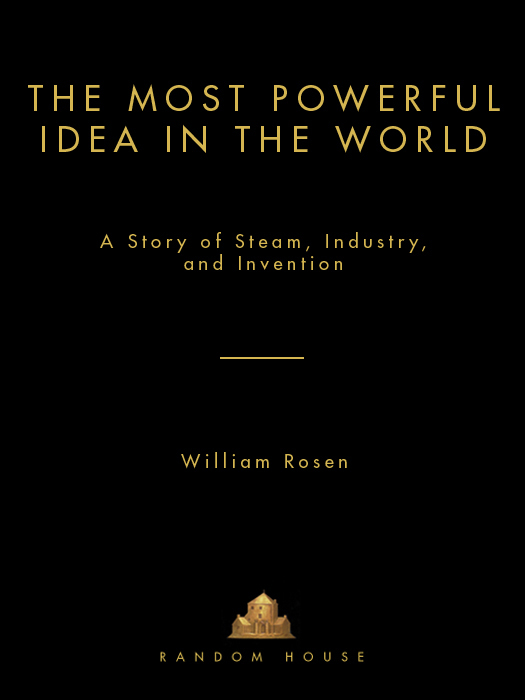
The Most Powerful Idea in the World
A Story of Steam, Industry, and Invention
کتاب های مرتبط
- اطلاعات
- نقد و بررسی
- دیدگاه کاربران
نقد و بررسی

Starred review from March 15, 2010
Former book editor and publisher Rosen (Justinian's Flea: Plague, Empire, and the Birth of Europe, 2007) pursues the question of why English-speaking peoples developed the key mechanical innovations that propelled the modern world.
In 1829, George and Robert Stephenson's Rocket inaugurated the age of steam-powered locomotion, hauling with it a rich lineage of previous inventions mostly by enterprising men in the Anglosphere—"Great Britain and its former colonies, including the United States, Canada, Australia, and New Zealand." Harnessing steam power abruptly doubled human productivity, which had been"flat as Kansas for a hundred centuries" before turning"like the business end of a hockey stick." What prompted the English and Welsh to take that spark of genius and make something useful, even profitable, with it? Patent law had a lot to do with fostering the"itch to own one's own work," and Rosen devotes much of his fascinating, wide-ranging narrative to the importance of common-law rulings in favor of the original inventors—e.g., Attorney General Edward Coke, the influential English jurist at the turn of the 17th century, vehemently ruled against monopolies and supported England's craftsmen. At the same time, Francis Bacon propounded science and invention as a free-flowing social enterprise, while John Locke defined the concept of property in terms of God-given labor. Open science, literacy, the growth of markets (e.g., the textiles explosion) and improved ironmaking skills all helped prod British, and soon American, inventors to solve mechanical problems both for personal interest and national glory. The only flaw in Rosen's exhaustive survey is the lack of attention paid to female inventors.
A staggering work of epistemological research.
(COPYRIGHT (2010) KIRKUS REVIEWS/NIELSEN BUSINESS MEDIA, INC. ALL RIGHTS RESERVED.)

May 1, 2010
Rosen ("Justinian's Flea: Plague, Empire, and the Birth of Europe") tackles the history of the Industrial Revolution by tracing the development of steam power. He says innovations in steam technology such as Thomas Newcomen's 1712 atmospheric engine and George Stephenson's 1829 locomotive built one upon another to create a prosperous, enduring industrial economy like none before it. He explains that though an understanding of steam had existed for some 2000 years, it was the English patent system with its inherent incentive of potential wealth that drove inventors to invest the requisite time to make and perfect technological breakthroughs. Rosen's narrative meanders between diverse subject threads from patent law through mining to physics and economics. He introduces numerous inventors and others ranging from Francis Bacon to Abraham Lincoln. His writing style is generally clear, with humorous asides, and with an overall approach reminiscent of the science historian and broadcaster James Burke. The many technical descriptions of pumps and other mechanisms would have benefited from better illustrations than the few period drawings included. VERDICT Patient readers will find thought-provoking this serious history of technological innovation and the veritable invention of our modern world.Lawrence Maxted, Gannon Univ. Lib., Erie, PA
Copyright 2010 Library Journal, LLC Used with permission.

May 15, 2010
The Industrial Revolution inspires more academic theories than absorbing narratives. Rosen, however, crafts one from subplots that connect with primitive industrialisms premier symbol: the steam engine. Ardent about historical technology, Rosen modulates his mechanical zeal with contexts underscoring that Thomas Newcomen and James Watt did not operate in a social vacuum. Fixing on patents as one prerequisite to their inventions, Rosen describes intellectual propertys English legal and philosophical origins as he segues to Newcomens and Watts backgrounds. A degree of social mobility in eighteenth-century Britain enabled their rise, but it was the specific economic situations in mining and textiles to which they responded that ensured it. These business matters provide Rosen with storytelling opportunities that feature capital investors, scientists studying heat, and over time, innovators who improved the steam engine from a stationary to a mobile power source: Rocket, the famous railroad engine built in 1829. Readers who like enthused authors will like Rosen, and fans of his Roman history Justinians Flea (2007) augment their number.(Reprinted with permission of Booklist, copyright 2010, American Library Association.)

























دیدگاه کاربران